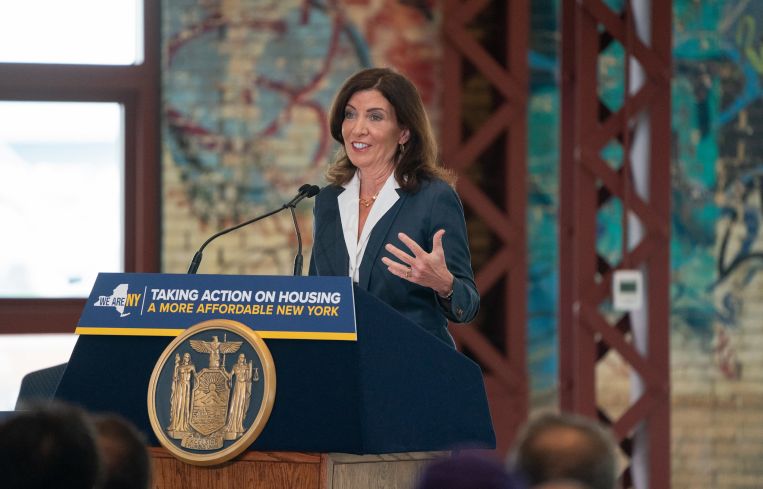Hochul Issues Executive Orders to Tackle New York’s Housing Crisis
By Aaron Short July 18, 2023 7:44 pm
reprints
Gov. Kathy Hochul is going solo in an attempt to hasten the construction of affordable housing in New York, after the state legislature failed to reach an agreement on her housing agenda this year.
The governor signed a series of executive orders Tuesday that reflect some of the real estate industry’s top priorities, including a substitute tax benefit enabling partially completed projects to move forward, new incentives encouraging municipalities to prioritize housing development in the future, and a 421a replacement for certain projects in Gowanus, Brooklyn.
Hochul said she was compelled to act after the legislature picked apart her housing agenda earlier this year. She said she didn’t want to wait for lawmakers to return to Albany next year before tackling the state’s housing crisis.
“We announced this bold plan and the legislature was not ready for it,” Hochul said Tuesday at the Powerhouse Arts Center in Gowanus. “I still believe we need a comprehensive solution to meet the scale of this housing crisis and we’re still pursuing, but that does not mean we have to freeze in time trapped by inertia.”
One executive order applies to 80 blocks in Gowanus, a Brooklyn neighborhood that was rezoned two years ago to allow for more than 8,000 units of housing, 3,000 of which would be below market rate. But little new construction has occurred after the 421a tax incentive lapsed in June 2022, and projects that have started construction cannot utilize the benefit if work on the site continues beyond June 2026.
Hochul’s order provides an alternative to 421a. The state’s economic development agency would administer a program allowing the state to purchase Gowanus properties and lease them back to the developer while retaining the state’s tax-exempt status at a site. The benefit developers receive would mirror 421a but would be administered through the state’s Payment in Lieu of Taxes (PILOT) agreement instead.
“I believe that today’s announcement will allow lenders to get comfortable with the uncertainties of whether projects could satisfy the 421a completion deadline, and will allow for those borrowers to finally close on their construction financing,” Brett Gottlieb, a partner at Herrick Feinstein, told Commercial Observer. “The new program is critical as these developments are not economically viable due to the deep affordability requirements mandated by the rezoning.”
Another Hochul order would prioritize the allocation of $650 million in state discretionary funds to municipalities that show a commitment to creating new housing. Instead of mandating suburban communities meet targets of 3 percent housing growth over a three-year period, the order would certify localities as a “pro-housing community” and steer state funding initiatives to them.
Hochul also directed state agencies to identify vacant state-owned sites that could become multifamily housing, and announced a request for proposals for a parcel of land next to the Jacob K. Javits Convention Center in Manhattan for residential development.
Some real estate leaders called Hochul’s moves a crucial step toward reversing the state’s housing shortage after the legislature delivered so little this past year.
“This was both strategic as well as tactical,” said Ken Fisher, a member of the business law department at Cozen O’Connor. “She’s leveraging a rezoning that had broad support, but she’s also showing the legislative leadership that she means business.”
But tenant advocates said the governor must re-engage with the legislature to craft policies that will meet the state’s vast housing needs.
“These actions are necessary, important, and yet insufficient to address the scale of our housing crisis,” Annemarie Gray, executive director for Open New York, a grassroots housing organization, said. “While we welcome these actions, New York will only see changes that match the magnitude of the crisis when the governor and the state legislature come together to pass major legislation.”
The governor’s executive actions occurred one month after the end of a legislative session that was marked by deep divisions over housing policy, even though Democrats control all branches of government.
In January, Hochul introduced plans to create 800,000 new homes, mandate growth targets for suburban communities, and change zoning laws to allow for the construction of denser housing in some city neighborhoods. But lawmakers refused to add those measures to the state budget as negotiations stalled for more than a month. Talks to revive an expired tax abatement for mixed-income housing, known as 421a, as well as pass bulked-up tenant protections also fell apart before the end of the year.
Hochul recently floated an executive order that would extend the PILOT benefit to all affordable housing projects across the state, but a disagreement between real estate owners and labor leaders over wage requirements on construction sites scuttled the idea. Albany lawmakers were not too keen on Hochul’s earlier plan to circumvent them to push forward her housing policies.
So far, Houchul’s new actions have a far more limited impact compared with those she proposed at the beginning of the year.
Her office’s announcement said that proposals must adhere to labor requirements that occurred under the 421a law, but some labor leaders still had questions about whether the order would honor labor standards. Building and Construction Trades Council President Gary LaBarbera said his executive board would convene Wednesday to review the governor’s order.



